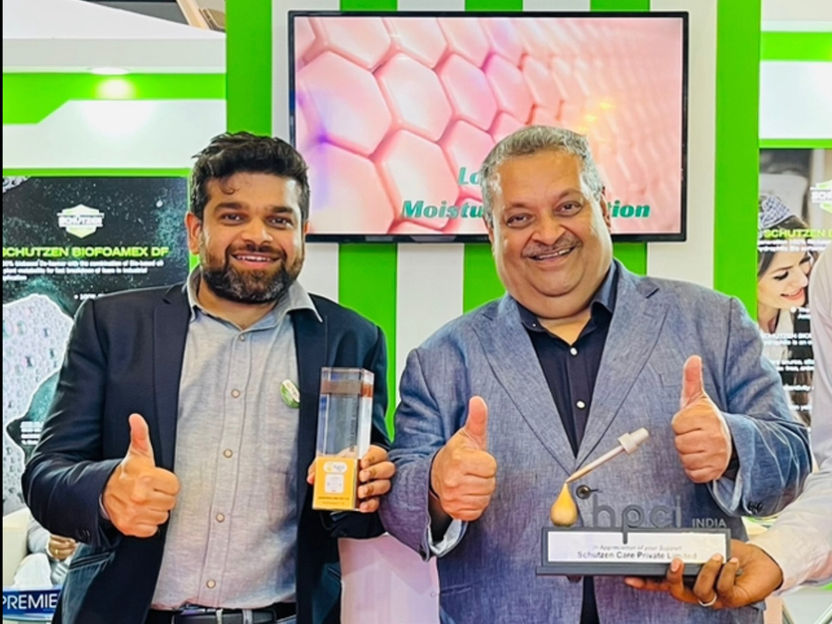Fighting global warming with tamarind polymers
Start-up wins ISC3 Innovation Award 2023
Advertisement
If South Mumbai is flooded in seven years, 20 million people will lose their homes. The number of cases of cancer in children will rise by 37 percent this year. The mountains of garbage in his homeland are getting bigger and bigger. As one of eight finalists in the Innovation Challenge 2023 of the International sustainable chemistry Collaborative Centre (ISC3), Raj Tanna highlights the consequences of increasing plastic production from fossil raw materials with three alarming facts: global warming, the release of harmful substances and poor end-of-life options. With his start-up, Schutzen Chemical Group, the founder is researching and developing biobased and biodegradable solutions with polymers from the fruit seeds of the tamarind tree, which can replace many fossil raw materials such as silicone, acrylates or polyurethane in certain industries. For this contribution to Sustainable Chemistry, the international expert jury of the Innovation Challenge honoured the start-up with the ISC3 Innovation Award 2023, endowed with 15,000 euros.

Raj and his mentor and father Mahendra Tanna
Founder Raj Tanna, who initially worked in fossil chemistry and later studied textile technology in Manchester, was motivated to work in Sustainable Chemistry by the ISC3 initiative, among other things. The collaborative centre has been supporting Schutzen as part of the ISC3 Global Start-up Service since 2020 – with success: the Indian start-up has developed a functioning technology to optimize the benefits of polymers from the fruits of the tamarind tree. For example, chemicals such as sodium hydrosulphite can be replaced in indigo dyeing for jeans production. Water consumption can be reduced by up to 60 percent as no rewashing is necessary. Another innovative solution is the replacement of silicone in skin and hair care products with more sustainable tamarind-based conditioning agents.
"The ISC3 is a catalyst for sustainable change. Schutzen has been directly motivated and inspired by interactions with ISC3 to develop more Sustainable Chemicals, which over the years have set the direction of thinking regarding the world's needs," says Raj Tanna.
Tamarind: a valuable, sustainable raw material for many applications
Background: Tamarind is a fruit tree that is widespread in India and, unlike the guar bean, for example, from which substances with similar properties to those of Schutzen polymers for textile printing are obtained, requires less fertile soil. Tamarind seeds have a low value in the food industry as only fruits (also known as Indian dates) are used, and the seeds remain a waste product. This makes tamarind seeds an inexpensive raw material. During his studies, Raj Tanna researched the processing of a tamarind polymer to use it as a natural thickening agent in the textile printing process with fiber-reactive dyes.
First success: Biobased Resin for wrinkle free finishing of fabrics
"Tamarind polymer has been used in the industry for almost 60 years, and many companies in India have used it for polyester printing over the past 20 years," explains Raj, who is supported by his father Mahendra Tanna and his experience, including in an internationally active German company for textile specialty chemicals in India.
"So it's not about a new polymer; it's more about understanding how this polymer can be processed and repurposed sustainably in a wide range of industries and new applications," says Raj Tanna. Following his research at the university, the Schutzen Chemical Group launched its own Biobased Resin finishing package to achieve wrinkle free effect of fabrics without the use of toxic Dimethyloldihydroxyethyleneurea (DMDHEU) resins, and in that way enabling more sustainable approach to cellulosic fibres such as cotton.
What chemical processes are used to obtain polymers from tamarind seeds at Schutzen?
Tamarind is a natural substance with a high molecular weight and nitrogen content. It must be made water-soluble for processing by depolymerization and carboxylation without impairing the nitrogen content. Schutzen has developed a patented process enabling to obtain tamarind polymers with unique properties. The results are two basic polymers: an amphoteric compound that can be used in skin and hair care products, for example, and a compound without basic or acidic groups that retains the nitrogen content and at the same time has good viscosity, among other things, without affecting the charge density. This process makes fibres shrink and crease-resistant and is essential for use in resin finishing.
Other news from the department business & finance
Most read news
More news from our other portals
Something is happening in the chemical industry ...
This is what true pioneering spirit looks like: Plenty of innovative start-ups are bringing fresh ideas, lifeblood and entrepreneurial spirit to change tomorrow's world for the better. Immerse yourself in the world of these young companies and take the opportunity to get in touch with the founders.































































